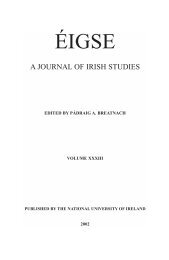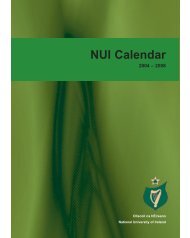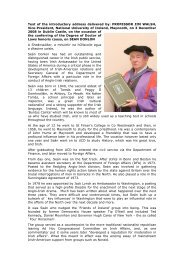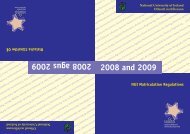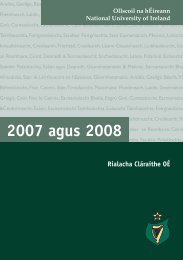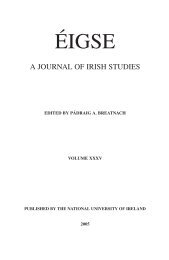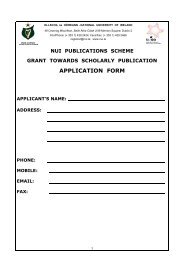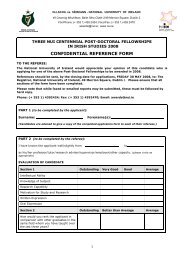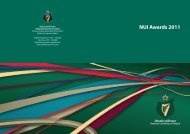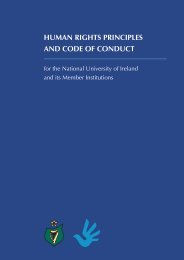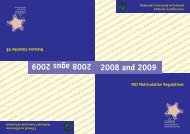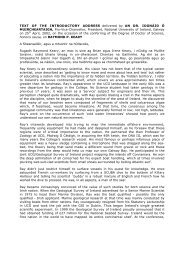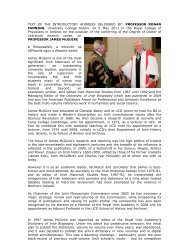Eigse Paged 2004 - National University of Ireland
Eigse Paged 2004 - National University of Ireland
Eigse Paged 2004 - National University of Ireland
Create successful ePaper yourself
Turn your PDF publications into a flip-book with our unique Google optimized e-Paper software.
ENCOUNTER AT THE FORD 21<br />
Then Medb went so that she was upon his chest with her thighs<br />
around him, and so that the lough hid [them] then; 33 and jealousy<br />
seized Ailill. Then Medb came [back] up.<br />
Also present is Ailill’s brother, Lugaid the Blind Poet, and it is to<br />
him that Ailill now speaks.<br />
‘Is álaind a ndogní an dam, a Lugaid, 7 an eilit isin loch,’ ar<br />
Ailill. ‘Cid nach gontar?’ or Lugaid 7 ní tuc urcor n-imraill<br />
ríam. ‘Teilg-siu dún orchur foru!’ ar Ailill. ‘Impó m’agaid cuctha,’<br />
or Lugaid, ‘7 tabrad gaí dam.’<br />
‘It is beautiful, Lugaid, what the stag (dam) and the doe are<br />
doing in the lough,’ said Ailill. ‘Why should they not be<br />
killed?’ said Lugaid. And he never missed. ‘Make a cast at<br />
them for us!’ said Ailill. ‘Turn my face toward them,’ said<br />
Lugaid, ‘and let a spear be given to me.’<br />
Lugaid then casts the spear, striking Fergus with a deadly blow as he<br />
is still washing himself in the lough. 34 Not only is Fergus’s doom due<br />
to a sexual encounter in the water, therefore: his dalliance with Medb<br />
leads to his being identified as a dam, like the dam tuli bound by the<br />
‘wanton woman’ in the impotence charm. 35<br />
The risky conjunction <strong>of</strong> warriors, women and water appears in<br />
yet another way in the literature. By entering into sexual relations<br />
with a woman in a watery setting, it may be possible for a hero to<br />
33<br />
I differ here from Meyer, who translates co taircell-som in loch annsin as ‘then he<br />
swam around the lake’: we should perhaps postulate haplography <strong>of</strong> earlier conda<br />
taircell-som. The verb do-aircheil, do-airchella has two meanings, reflecting the two<br />
stems which lie behind it: ‘hides, withdraws, takes away’; and ‘encompasses, contains;<br />
hems in, confines’. Of these, only the first will readily yield sense in the present<br />
context. For the second, DIL proposes an extended usage ‘goes round, makes a<br />
circuit <strong>of</strong>’, but gives only two examples viz. the passage here under discussion, and<br />
an instance from an anecdote in the Book <strong>of</strong> Leinster where co tairchellsatar relic 7<br />
martra Petuir 7 Phóil is taken to refer to the circumambulation <strong>of</strong> relics in Rome (LL<br />
ll 36489-90). While this parallel supports Meyer’s interpretation, it also seems legitimate<br />
to take the verb in a better-attested meaning.<br />
34<br />
Aided Fergusa maic Roich, ed. Kuno Meyer in idem, The death-tales <strong>of</strong> the Ulster<br />
heroes (Dublin 1906) 32-4 (my translation). There is an obvious similarity between<br />
this story and the Norse legend in which the spiteful Loki prevails upon the blind<br />
Hoðr to make a fatal cast at Baldr: Snorri Sturluson, Edda: Prologue and<br />
Gylfaginning, ed. Anthony Faulkes (Oxford 1982) 45-6.<br />
35<br />
As Ranke de Vries has pointed out to me, something similar may be involved in<br />
Acallam na Senórach (ed. Whitley Stokes, Irische Texte 4/1 (Leipzig 1900) 91-2): here<br />
the water-woman Lí Ban massacres a herd <strong>of</strong> deer (fiada) who have run into the sea.



